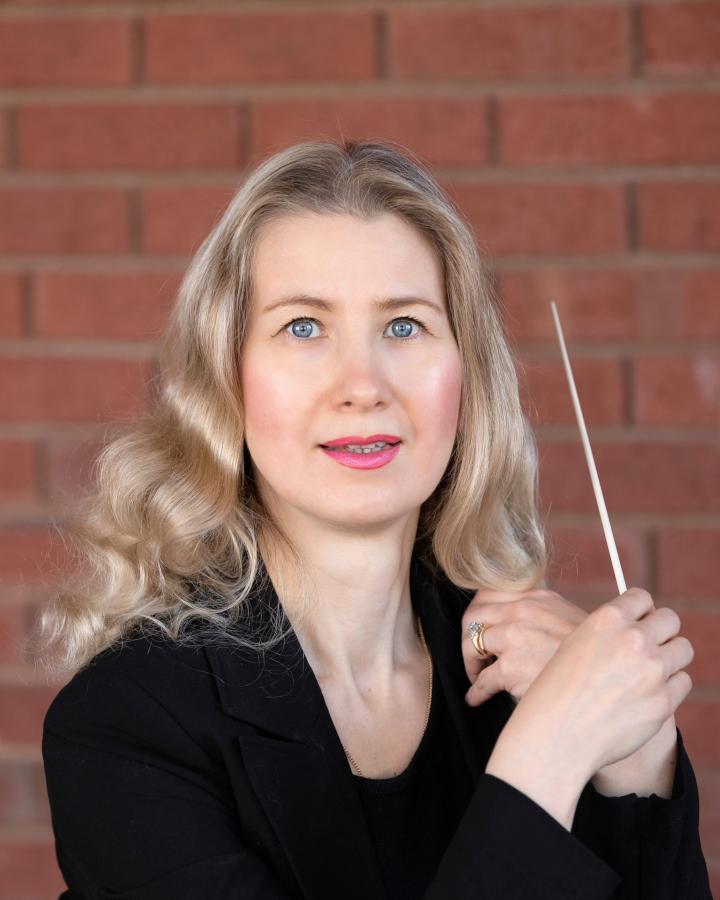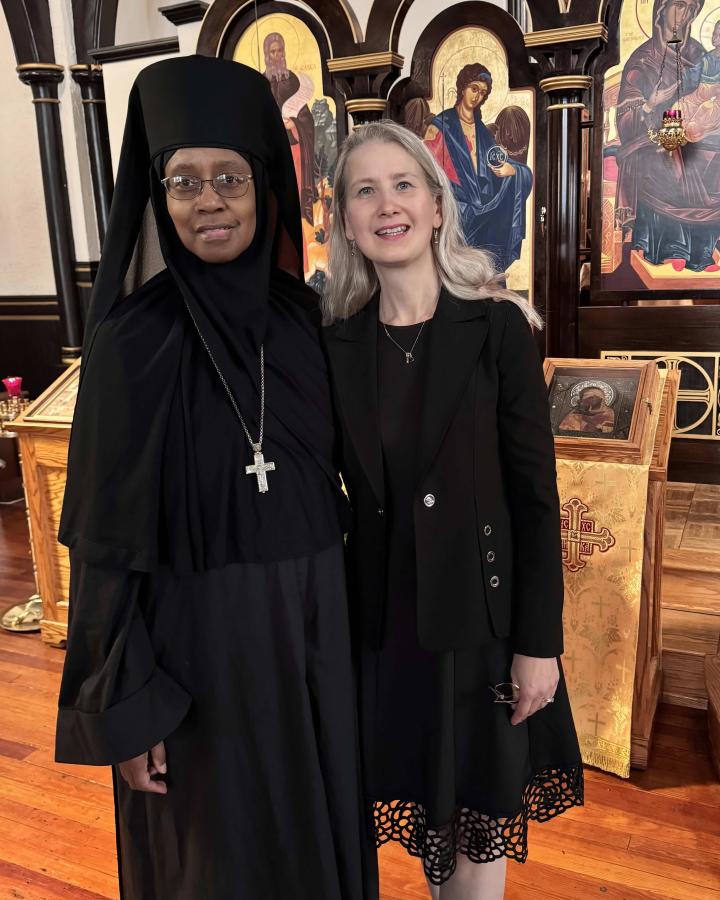
Zhanna Lehmann is our Woman of the Week. She is a professional musician, choral conductor, speaker, music editor and consultant, who is also the premier interpreter of Mother Katherine Weston’s Jubilee Liturgy music. We asked her to tell you how she got from where she started in classical music to working with a contemporary Orthodox composer:
"The life experiences that brought me to the Church ministry show the amazing ways of divine Providence. I began my musical education at my hometown in Russia and continued at the Kazan Musical Conservatory in Russia, completing both bachelor’s and master’s degrees. Kazan is a city where St. Raphael of Brooklyn served as a professor at the Kazan Theological Academy at the end of the 19th century. When my family joined the Antiochian Archdiocese here in the States and I learned about St. Raphael, I felt a special connection to this Saint and a providential concurrence of life events.
"During my years at the Conservatory, I sang in an elite choir under the baton of Prof. Semen Kazachkov (1909–2005), who was a conductor from the Saint Petersburg Conservatory and carried the legacy of the old Russian Saint Petersburg School of Conducting. My job when I was a student was to sing in a large St. Nicholas Cathedral choir. That first experience in Russia of being a singer of a high-level choir in the Conservatory as well as a singer of the cathedral choir provided me with a diversified experience, which I appreciated years later, when I took on different roles serving the Church in the US. The first intense experience in Russia was like a concentrated essence of the multiple skills and knowledge.
“When I graduated, I became an assistant principal and teacher for the School of Music in my hometown. I taught music theory, piano at all levels, directed several youth choirs, which won awards and other recognition at regional music festivals and competitions. On my arrival in the US, I started a family, and I decided to continue pursuing my musical career. Now I hold a Doctor of Musical Arts degree in choral conducting and piano pedagogy from the University of Illinois in urbana-Champaign. My research focused on late 20th-century Soviet choral music, particularly the work of Alfred Schnittke “Penitential Psalms.”
“The other area of interest is Byzantine chanting. When I became a member of Saint Nicholas Antiochian Church, I joined the chanters and the more I chanted, the more I loved it. Part of my personality is that when I am interested in something, I want to learn it to the depths. So, first I chanted from the Western notation and later I started learning and enjoying the Byzantine notation. I am the chanter’s leader as well as the choir director at St. Nicholas church.
“My work experience in the US includes teaching disciplines such as conducting, directing choir ensembles, music appreciation, theory, and oral skills at the University of Illinois and other local schools. I serve on the board of the Sacred Music Department of the Antiochian Archdiocese and am a faculty member of the Antiochian Orthodox Ecclesiastical Online Music School where I teach a few classes on conducting and choral methods, and advanced music theory.
I enjoy presenting at numerous national, international, and regional conferences on various topics within the field of choral music and music theory and offer choral and conducting workshops for choirs and choir directors nationwide.
I am also the founder and director of the Illinois Orthodox Choir; a choral group open to singers of all faiths in the Champaign-Urbana area. The choir performs locally, and we provide outreach concerts to the churches of Central Illinois and Indiana, nursing homes, and local community organizations. The repertoire of the choir features the works of American, Slavic, and Byzantine Orthodox composers.
“The Illinois Orthodox Choir is what brought me to work with Mother Katherine. We had a mutual friend who sang in the choir, and she mentioned about the Saint Moses the Black Fellowship, and Mother Katherine, and asked if I would be interested in looking at her choral works. I am always interested in looking at new choral work, so that's how we happened to connect. Mother Katherine sent scores to me for three liturgical pieces inspired by African American Spirituals—an Anaphora (2005), a Cherubic Hymn (2019), and an “Our Father.” (2021) The Illinois choir under my direction performed all three pieces during our annual Nativity Concert.
“That first collaborative work resulted in the production of our CD together. Then in 2022, I was asked to present at the national conference of the Saint Moses the Black Fellowship in Pittsburgh. At that conference after my presentation, I asked Mother Katherine, ‘Why wouldn't you do the whole liturgy?’ That encouraged her to undertake the composition of the whole Jubilee Liturgy, and that's how we started working together on the music scores. The debut of the Jubilee Liturgy took place at the FSMB National Conference in Houston, October 2023 by blessing of the Metropolitan SABA.
“Since then, I’ve been working as a member of the Fellowship’s music ministry. I am blessed and honored to be an editor and consultant of the music compositions by Mother Katherine. Every new hymn is an excitement, joy and anticipation for me, like a child who wants to know what is inside of a gift box. The first score of the Jubilee Liturgy was expanded with more hymns to fit both, Antiochian and OCA rubrics. Other hymns that we worked on after the Liturgy included Paschal Troparion “Christ is Risen!” and “Gladsome Light”, which are very beautiful. This work is continuous and God willing, we'll keep working on more hymns together and bringing singers together nationwide for the FSMB conferences.”
“Conducting is a form of art. I titled the chapter in the book “Jubilation! On Sacred Music Cultures” that was published by the Fellowship of St. Moses the Black in 2022, “The Voice of the Heart.” Once I heard from a great singer and teacher that the sound of somebody’s voice is the sound of their soul and heart. I think it's very beautiful. Conducting a choir evokes the sounds of many singers' hearts.
“Conducting is a form of visual art that evokes the sound. I firmly believe that a conductor should receive profoundly good training in conducting techniques as well as in other musical disciplines to deal with such a treasure as a human voice. Learning doesn’t stop with the end of taking classes in academia. I encourage my students in conducting classes to conduct all the time - while walking, working, dancing, waiting, when you are happy or sad to express that or conducting while listening to a song on the radio. The possibilities and variants of what to express with conducting gestures are non-limited.”
“Conducting is a bodily expression. It is like dancing. Flexibility and ability to control physical motions are crucial in dancing, the same in conducting. Relaxed, but clear, avoiding tension but being engaged, keeping arms lifted but with great mobility and control, being able to express with minimal gestures but still radiating energy of music rhythm and much more. Conducting is the expression of your body, and the body is sacred, and these motions are the expression of that.
“So you need awareness of your body even as you are evoking sound from your singers. But you’re not just expressing on your own, because you can't completely control the singers. They're creating their own sound through their voices and hearts and souls. You are evoking that synergy and work to be able to shape it in the way that you hear it. In this way, conducting is a spiritual discipline as well. It's that mysterious, mystical work that happens between conductor and singers. Thus, the conductor should mature spiritually as well, because you’re touching somebody's hearts and souls to sing. I didn't think this way 20 years ago. This what I have experienced in my later years. God is the Word. Any word that we sing is a living matter and the sound of this word doesn’t exist separably from it but as a sacred part of it.”
“There is also a cultural element in choral conducting and teaching that is important. In any group setting, there's culture, a certain way of communication and behavior, attitudes, shared beliefs and values that shape the group’s interactions. If a choir doesn't have that culture, then it mostly fails. Creating the culture within a group is a process and takes time and hard work by both the conductor and singers. For a choir singing as one voice is always my goal.”
“As a conductor, I also look to three women that I admire: St. Ioanna (Joanna) the Myrrh-bearing Woman, St. Xenia of Saint Petersburg (which is the name of the monastic community where Mother Katherine lives, another providential concurrence of life events), and St. Kassiani. Saint Xenia and I have a special relationship from back when I lived in Russia and visited her gravesite and chapel in St. Petersburg. All three of these women to me are courageous women that stepped out of what was considered the norm for women in a society of that time and stood out of their comfort to serve God. I believe this applies for church musicians: for us to perform all the responsibilities and to serve our Lord to the best of our abilities and given gifts, it takes out of the comfort zone in many cases. These three saints are an example to me as a musician as well as a woman conductor.”

As always, we asked our Woman of the Week, Zhanna Lehmann, to tell you about her morning routine:
“I like keeping my morning routine consistent. It usually looks like good, aromatic coffee and dried pecan granola clusters for my breakfast, prayers, helping my mother who lives with me with her breakfast, then taking care of the pets. I have five cats and two dogs. Then, reading the news online, checking my emails, and a few times a week I play tennis at the local tennis center, just a few minutes away from my house. Tennis has been an essential part of my life, which is another thing that I shared with Mother Katherine. She loves watching tennis, and I like playing it. It provides physical activity to me, mental engagement, and social interaction. It is like conducting - it requires focus on hitting the ball, a strategic approach, and creativity to choose a stroke to get a point.
“I love nature, so in my mornings in the summer, I enjoy taking walks, listening to birds, and observing what is happening in the natural world. I also grow roses. I have over 60 bushes. I love seeing in the morning what new flowers have come and enjoying these moments of smelling the roses."
Thank you, Zhanna!


